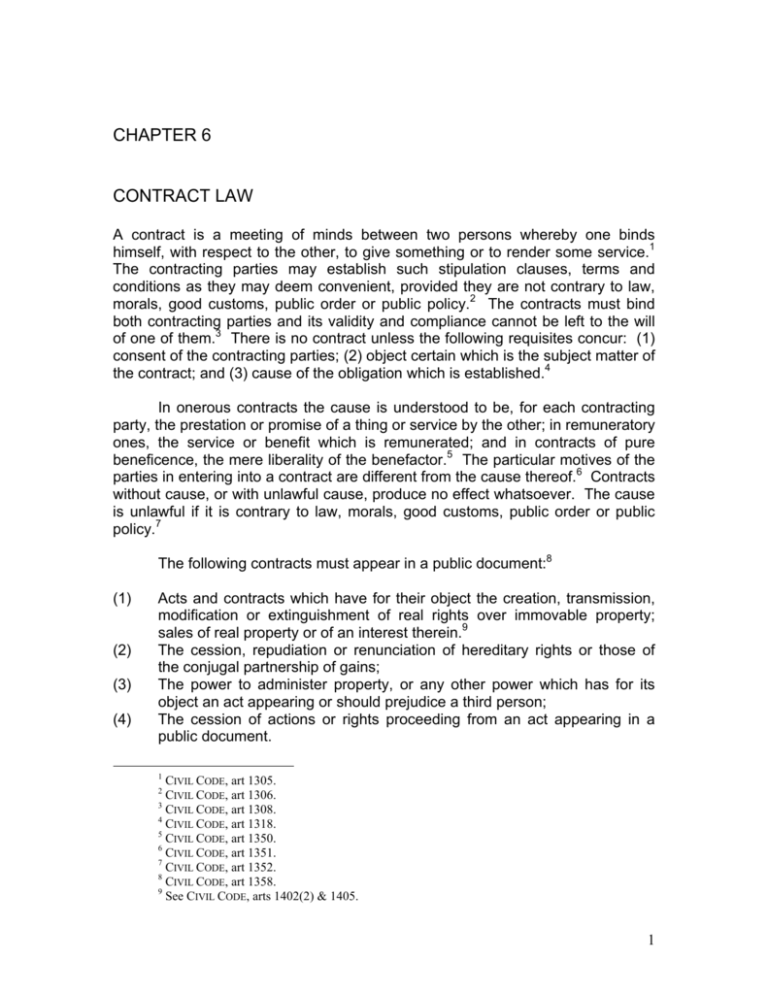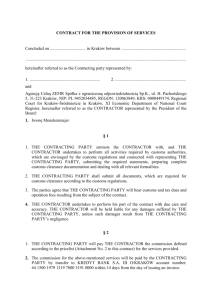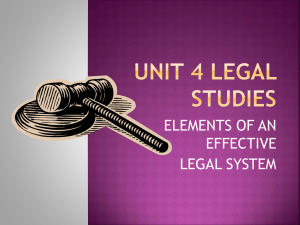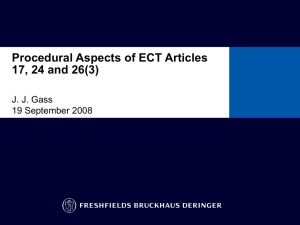Contract Law - ASEAN Law Association
advertisement

CHAPTER 6 CONTRACT LAW A contract is a meeting of minds between two persons whereby one binds himself, with respect to the other, to give something or to render some service.1 The contracting parties may establish such stipulation clauses, terms and conditions as they may deem convenient, provided they are not contrary to law, morals, good customs, public order or public policy.2 The contracts must bind both contracting parties and its validity and compliance cannot be left to the will of one of them.3 There is no contract unless the following requisites concur: (1) consent of the contracting parties; (2) object certain which is the subject matter of the contract; and (3) cause of the obligation which is established.4 In onerous contracts the cause is understood to be, for each contracting party, the prestation or promise of a thing or service by the other; in remuneratory ones, the service or benefit which is remunerated; and in contracts of pure beneficence, the mere liberality of the benefactor.5 The particular motives of the parties in entering into a contract are different from the cause thereof.6 Contracts without cause, or with unlawful cause, produce no effect whatsoever. The cause is unlawful if it is contrary to law, morals, good customs, public order or public policy.7 The following contracts must appear in a public document:8 (1) (2) (3) (4) Acts and contracts which have for their object the creation, transmission, modification or extinguishment of real rights over immovable property; sales of real property or of an interest therein.9 The cession, repudiation or renunciation of hereditary rights or those of the conjugal partnership of gains; The power to administer property, or any other power which has for its object an act appearing or should prejudice a third person; The cession of actions or rights proceeding from an act appearing in a public document. 1 CIVIL CODE, art 1305. CIVIL CODE, art 1306. 3 CIVIL CODE, art 1308. 4 CIVIL CODE, art 1318. 5 CIVIL CODE, art 1350. 6 CIVIL CODE, art 1351. 7 CIVIL CODE, art 1352. 8 CIVIL CODE, art 1358. 9 See CIVIL CODE, arts 1402(2) & 1405. 2 1 The following are excuses for non-performance of contracts: (1) (2) (3) (4) (5) (6) (7) (8) when the contract refers to an obligation which consists of the delivery of a determinate thing and the latter is lost or destroyed without the fault of the debtor, and before he has concurred in delay; when the contract refers to an obligation and the latter is merged in the characters of creditor and debtor in one and the same person; when the contract is novated; when the contract refers to service and the latter has become difficult as to be manifestly beyond the contemplation of the parties; when the object of the contract refers to things outside the commerce of men; when the object of the contract refers to intransmissible rights or a future inheritance except in cases expressly authorized by law; when the contract refers to services which are contrary to law, morals, good customs, or public policy; when the contract refers to objects for which determination as to their kind is not possible.10 The following are agreements that cannot be proved except by writing, or by some note or memorandum subscribed to by the party sought to be charged, or by his agent, or by secondary evidence of its contents: (1) (2) (3) (4) (5) (6) an agreement that by its terms is not to be performed within a year from the making thereof; a special promise to answer for the debt, default or miscarriage of another; an agreement made upon the consideration of marriage, other than a mutual promise to marry; an agreement for the sale of goods, chattels, or things in action, at a price not less than 500 pesos, unless the buyer accepts and receives part of such goods and chattels; an agreement for the leasing for a longer period than one year, or for the sale, of real property or of an interest therein; a representation as to the credit of a third person.11 The subject matter of the contract must be a determinate thing and licit, and the vendor must have a right to transfer their ownership of it at the time it is delivered. Things having a potential existence may also be the object of a contract of sale. The efficacy of the sale of a mere hope or expectancy is deemed subject to the condition that the thing will come into existence. The sale of a vain hope or expectancy is void.12 10 CIVIL CODE, arts 1231(4) and (6), 1262, 1267, 1291, 1311, 1347 & 1409(1) & (4). CIVIL CODE, art 1403(2) (a)-(f). 12 CIVIL CODE, arts 1458-1561. 11 2 The goods which form the subject of a contract of sale may be either existing goods or ‘future goods’, namely, goods to be manufactured, raised, or acquired by the seller after the perfection of the contract. Things subject to a resolutory condition may also be the object of the contract of sale. A contract for the delivery of an article at a certain price, which the vendor in the ordinary course of his business manufactures or procures for the general market, whether the same is on hand at the time or not, is a contract of sale, but if the goods are to be manufactured especially for the customer and upon his special order, and not for the general market, it is a contract for a piece of work.13 A recent legislation governing transactions carried out on cyberspace is the ‘E-Commerce Act’.14 It covers all transactions whether commercial or noncommercial carried on electronically and provides for modes of authenticating electronic data messages or electronic documents and of safeguarding their reliability. Under this law, legal recognition is accorded electronic documents which shall have the same legal effect, validity and enforceability as any other documents or legal writing. For evidentiary purposes, electronic documents become the functional equivalent of written document provided that formalities required for validity of document under existing laws is observed. Thus, the law provides for legal recognition of electronic signatures which shall be equivalent of a person’s signature on a written document if proved by showing that a prescribed procedure, not alterable by the persons interested in the electronic document.15 For purposes of this Act, the Supreme Court promulgated the ‘Rules on Electronic Evidence’ which apply to all civil and criminal actions and proceedings, as well as quasi-judicial and administrative cases.16 13 CIVIL CODE, arts 1462, 1465 & 1467. Rep Act No 8792 (2000). 15 Id, s 8. 16 AM No 01-7-01-SC, 08 March 2001, effective 01 August 2001. 14 3











